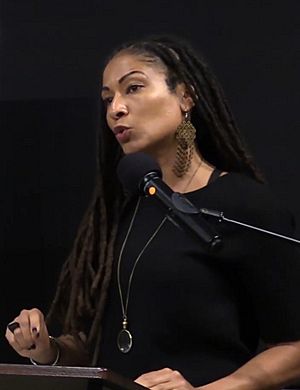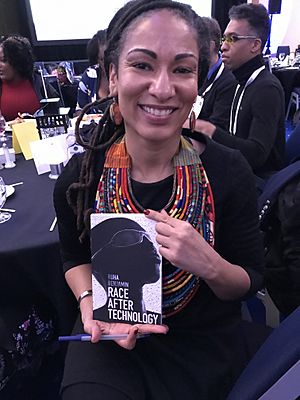Ruha Benjamin facts for kids
Quick facts for kids
Ruha Benjamin
|
|
|---|---|
 |
|
| Born | 1978 Wai, Maharashtra, India
|
| Education | Spelman College (BA) University of California, Berkeley (MA, PhD) |
| Scientific career | |
| Institutions | Princeton University |
Ruha Benjamin is a professor at Princeton University. She studies how new inventions and technology affect fairness and equality. She especially looks at how technology connects with ideas about race and justice.
Professor Benjamin has written several important books. These include People's Science (2013), Race After Technology: Abolitionist Tools for the New Jim Code (2019), and Viral Justice (2022). In 2024, she received a special award called the MacArthur Fellowship.
Contents
Her Early Life
Ruha Benjamin was born in a clinic in Wai, Maharashtra, India. Her father was African-American, and her mother had Indian and Persian family roots. She became interested in how science, technology, and medicine affect people because of stories her parents told. These stories were about how people's bodies interacted with medical tools in the clinic where she was born.
She has lived in many different places around the world. These include places like South Central Los Angeles, Conway in South Carolina, Majuro in the South Pacific, and Eswatini in Southern Africa. These experiences and cultures helped shape how she sees the world.
Her Career Journey
Education and Early Work
Ruha Benjamin first studied sociology and anthropology at Spelman College. After that, she earned her PhD in sociology from the University of California, Berkeley in 2008. She then did special research programs at UCLA and Harvard Kennedy School.
From 2010 to 2014, she was a professor at Boston University. She taught about African American Studies and sociology there.
Important Books
In 2013, Ruha Benjamin's first book came out. It was called People's Science: Bodies and Rights on the Stem Cell Frontier. In this book, she looked closely at how new ideas and designs can sometimes make unfairness worse. She explored how science and popular ideas about genetics sometimes use old ideas about race and gender.
Her book Race After Technology: Abolitionist Tools for the New Jim Code was published in 2019. In this book, she explains how social unfairness, especially racism, can be built into the way internet technologies work. She created the idea of the "New Jim Code." This term helps explain how computer programs and apps that seem fair can actually repeat or even make racial bias worse.
Race After Technology won several awards. These included the Oliver Cox Cromwell Book Prize in 2020 and the Brooklyn Public Library Literary Award for Nonfiction.
Current Work and Projects
Today, Professor Benjamin is a full professor at Princeton University. She teaches in the Department of African American Studies. Her work focuses on how science, technology, and medicine connect with ideas about race, fairness, and power.
In 2018, she started the JUST DATA Lab. This is a special place where activists, tech experts, and artists can work together. They explore how data can be used to help create more justice in the world. She also helps lead programs at Princeton that focus on global health and digital studies.
Professor Benjamin has given talks to important groups like the United Nations and the NAACP Legal Defense and Education Fund. Her work has also been shared in many popular magazines and news sites. These include Essence Magazine, LA Times, The Washington Post, and The New York Times.
Awards and Recognitions
Ruha Benjamin has received many awards and fellowships for her important work. These include honors from the Marguerite Casey Foundation and the American Council of Learned Societies.
In 2017, she received the President's Award for Distinguished Teaching at Princeton. This award recognized her excellent teaching skills. In 2024, she was named a MacArthur Fellow. This is a very prestigious award given to talented people in many fields.
On April 11, 2024, she received an honorary Doctor of Science degree from Spelman College. This was a special recognition of her achievements.


